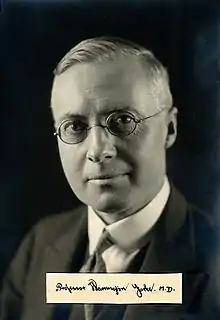Warrington Yorke
Warrington Yorke FRS (11 April 1883 – 24 April 1943) was a British parasitologist and Professor of Tropical Medicine at the University of Liverpool.
Warrington Yorke | |
|---|---|
 Warrington Yorke. | |
| Born | Warrington Yorke 11 April 1883 Lancaster, England |
| Died | 24 April 1943 (aged 60) Birkenhead, England |
| Nationality | British |
| Alma mater | University of Liverpool |
| Spouse(s) | Elizabeth Annie Greening |
| Children | a son and a daughter |
| Awards | FRS |
| Scientific career | |
| Institutions | Liverpool School of Tropical Medicine |
Early life and education
He was born at Lancaster, the son of Rev Henry Lefroy Yorke, a Wesleyan minister, and his wife, Margaret Warrington, the eldest of four brothers and two sisters.[1]
He attended University School, Southport and Epworth College, Rhyl, before studying medicine at the University of Liverpool.
Career
In 1907, he joined the Liverpool School of Tropical Medicine. From 1914 to 1929, he was Walter Myers professor of parasitology, and from 1929 until his death he was the Alfred Jones professor of tropical medicine, University of Liverpool.
During World War I, Yorke served as a captain in the Royal Army Medical Corps, based in Malta from 1915-16. He returned to Liverpool in 1916, and produced more than thirty reports on "Studies in the treatment of malaria".
Selected publications
- "The Nematode Parasites of Vertebrates" (1926), with Philip Alan Maplestone.
Awards and honours
In 1925, he was awarded the Chalmers memorial gold medal of the Royal Society of Tropical Medicine and Hygiene for his services to tropical medicine.
He was made a Fellow of the Royal Society on 5 May 1932.[2]
Personal life
In 1916, he married Elizabeth Annie Greening; they had a son and a daughter.
Yorke died at his home, 4 Bryanston Road, Prenton, Birkenhead, on 24 April 1943 and was survived by his wife.
References
- "Warrington Yorke". Oxforddnb.com. Retrieved 2013-08-01.
- "Fellow details". Royal Society. Retrieved 1 October 2019.
